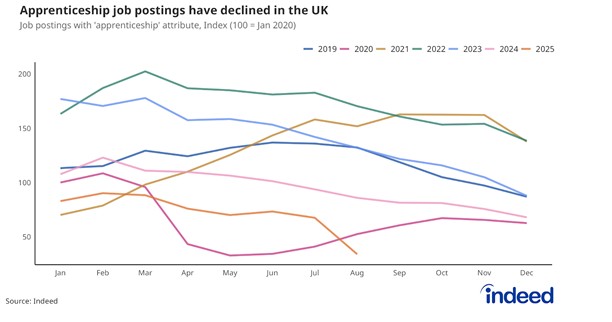New research from Indeed reveals 33% of young people now see apprenticeships as a viable route into the workforce, second only to university. Similarly, over 80% of employers acknowledge the value of apprenticeships as an effective way into employment, citing a lack of experience (45%) and work readiness and skills (39%), as issues when hiring entry-level workers.
Despite the growing interest in apprenticeships by both job seekers and employers, the number of positions available in the UK is declining, creating a barrier for young people eager to pursue this route. This shortfall is likely to hit hardest among NEETs (young people not in education, employment, or training) and those seeking alternatives to university degrees due to rising student debt.
Falling opportunities undermine rising interest
The share of apprenticeship job postings dropped by 17% between July 1st 2023, and the same date in 2024, followed by a smaller decline of 9% from July 1st 2024, to July 1st 2025 (as seen in the graph below).

One possible factor behind the decline in apprenticeships is the end of government funding for degree-level apprenticeships for those aged 22 and over, set for January 2026. At the same time, the announcement of 120,000 additional training opportunities for young adults may shift young people’s interest toward other career options and affect perceptions of apprenticeships.
Matt Burney, Senior Strategic Advisor at Indeed, comments: “Apprenticeships are a vital pathway for young people, particularly for those who want to start earning straight after school or take a more hands-on, non-academic route. But they’re not the only option. Jobseekers can also build experience and confidence through long-term internships, graduate placements, and entry-level roles that don’t require prior experience. All of these can serve as valuable stepping stones into the workforce and future career growth.”
Encouragingly, recent data shows that only 14% of UK job postings specify a formal education requirement, and just 3.7% ask for a bachelor’s degree, widening access to those without specific qualifications or direct experience.
Indeed’s Matt Burney shares his top tips for standing out when applying for entry-level roles, apprenticeships, or training programmes:
- Do your research – learn about the employer and role to tailor your application and highlight relevant skills
- Polish your CV – showcase your education, experience, and enthusiasm for learning
- Tailor your application – customise your answers and include keywords from the job description
- Share your story – use personal examples, such as school projects, volunteering, or hobbies, to show why you’re a good fit
- Include a cover letter – even if optional, it’s a chance to stand out and explain why you’re the right candidate
- Proofread carefully – check for spelling and grammar errors, and ask someone you trust to review it before you submit it
*Apprenticeship job postings are identified by listings that include ‘apprentice’ attributes – specifically those that mention apprenticeships, traineeships, or positions intended to provide practical training in a particular trade or profession.




